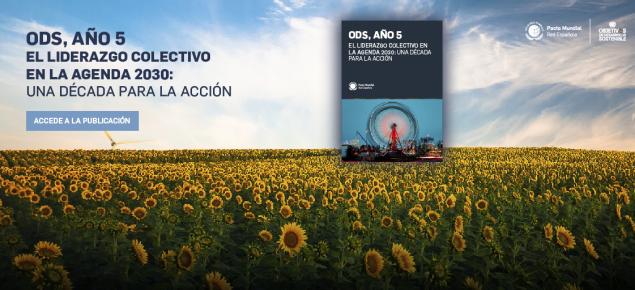30/09/2020
SDG8. 84% OF MANAGERS CONSIDER THAT COVID-19 WILL NOT AFFECT OR WILL IMPROVE THE INTEGRATION OF SUSTAINABILITY IN THEIR COMPANY

The guide published by the Spanish Global Compact Network analyses, through a survey of 161 Spanish entities, the integration of the SDGs in different company departments and the impact of COVID-19 on sustainability.
The Spanish Global Compact Network has presented its publication “SDGs Year 5, Collective leadership in the 2030 Agenda: a decade for action”,which analyses the level of knowledge and implementation of the 2030 Agenda in the most significant areas of organisations and highlights the need to promote collective leadership in order to achieve the Sustainable Development Goals ( SDGs). The publication was presented this morning, in the context of the 5th anniversary of the approval of the SDGs, via a virtual session in which Ione Belarra, Secretary of State for the 2030 Agenda of the Government of Spain, took part, together with Clara Arpa, as the new President of the Spanish Global Compact Network.
In the words of Clara Arpa, President of the Spanish Global Compact Network, "we firmly believe in the immense transformational capacity of companies, both in the potential of business leadership by senior management, integrating the SDGs throughout the organisation, as well as in the collective leadership exercised by each person that makes up the company in favour of achieving the 2030 Agenda.”
To encourage companies to promote collective leadership within the organisation, the Spanish Network proposes 10 keys that range from the integration of the Ten Principles and the 2030 Agenda in the company's strategy, to the incorporation of variables linked to sustainability in the company's remuneration system.
The integration of the SDGs in different departments of Spanish companies
As a starting point for analysing and promoting collective leadership for SDGs within Spanish companies, the Spanish Network has carried out a survey on the integration of SDGs with 411 managers of 161 entities that are part of the Global Compact, belonging to 13 departmental areas, from executive management or top positions to human resources, marketing or purchasing departments.
Among the conclusions of the survey, it is striking that, despite the fact that 71% of area managers claim to have a broad impact on the 2030 Agenda through their activities, only 61% claim to know the 2030 Agenda in detail. As indicated by the SDG Compass, the guide for business action on the SDGs of the Global Compact, GRI and WBCSD, knowledge of the SDGs is the first step for them to be integrated into the business strategy, so this percentage, despite being positive, is still not enough.
On the other hand, the survey also analyses the actions taken for integration of the 2030 Agenda within the organisation, where inclusion in the department's strategy stands out. This measure is taken mainly by the sustainability and environment areas, at 92% and 70%, respectively, while the financial, purchasing and regulatory compliance departments barely include the 2030 Agenda framework in their strategy (at around 33%).
According to Arpa, “it is important that the SDGs are integrated in each and every area of the company, not only in the sustainability department, as they all have an impact on the 2030 Agenda. We are talking about a cross-cutting framework that must be placed at the centre of the company's strategy, with the aim of starting on the path to a better recovery from the crisis caused by COVID-19. And now, more than ever, we need the business sector to lead the transformation to fairer, more responsible, sustainable and resilient systems.”
The mapping of the SDGs, on the other hand, is carried out to a greater extent by the sustainability area and by the management and board of directors, at 77% and 58%, respectively. Areas for improvement include the establishment of public commitments, carried out by only 36% of those surveyed, as well as training in SDGs, as the average number of training sessions on SDGs offered to employees in different departments by companies stands at just 27%.
Finally, the survey also considers the impact of the COVID-19 crisis on the integration of sustainability. In this sense, 84% of the area managers consulted believe that the pandemic will not affect their work in the field of sustainability or that it will improve its integration. A statement that carries significant weight in terms of the executive management and the board of directors, where 53% think that it will not have an effect and 30% support its positive impact. This last statement is a clear declaration of intent by business leaders in favour of the United Nations post-COVID-19 recovery motto “Build back better”, which encourages governments and companies to promote recovery based on sustainability and resilience criteria.
SDG Ambition: a new framework for the Decade for Action
Presented on the occasion of the fifth anniversary of the SDGs, the publication is also framed by the beginning of the Decade for Action for the SDGs - announced by the Secretary of the United Nations Antonio Guterres for the next 10 years -, and in the midst of the COVID-19 pandemic, meaning that collective effort is now needed more than ever to make the 2030 Agenda a reality. In fact, the Decade for Action is a chapter that carries a lot of weight within the document, whereby mobilisation, increased ambition and the development of innovative solutions are proposed as axes.
In order to increase business ambition in the SDGs, the publication includes the presentation of SDG Ambition, a new SDG application framework created by the United Nations Global Compact with the aim of serving as a roadmap for the integration of the SDGs and the Ten Principles of the Global Compact in any business strategy. As such, the document explores the three main elements of the framework: setting ambition in strategy and governance, integrating strategic elements into all operations and encouraging stakeholder engagement.
Share: